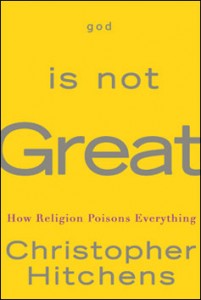 I have a bunch of articles on the burner, but when I heard of Hitchens’ death, and read some obits, I thought I’d comment. I’ve not read any of his books. I’ve seen him on various talking head shows, including The Daily Show, and I generally knew what he was about. It wasn’t until reading some of the thoughts he’d had regarding religion, and specifically, Mother Teresa, that I become really interested, ironically, now that he is no more.
I have a bunch of articles on the burner, but when I heard of Hitchens’ death, and read some obits, I thought I’d comment. I’ve not read any of his books. I’ve seen him on various talking head shows, including The Daily Show, and I generally knew what he was about. It wasn’t until reading some of the thoughts he’d had regarding religion, and specifically, Mother Teresa, that I become really interested, ironically, now that he is no more.
I admire his fearlessness. It is never easy going against the accepted thinking of the masses. To do it in such an aggressive non apologetic way is almost shocking. Naturally, millions can be and are offended by his opinions. And that’s what makes him so amazing to me. I post articles, and there are a few people who violently disagree with my thoughts, logic, opinions. And it’s disconcerting, to say the least, when faced with such vehemence. Even when I can conclude that the comments are from the lunatic fringe, such as response to the Water For Elephants and censorship article, I cringe internally, being a person who wants to be liked by all.
Hitchens apparently never worried about being liked. Because there is no doubt that not only was he disliked in certain quarters, but that he was probably hated with a passion for his article in Vanity Fair on Mother Teresa. His support of the 2nd war in Iraq did not win him friends on the left side of the political realm where he was thought to reside most of his intellectual life.
His position on the lack of a supreme being is fascinating. He called himself an antitheist. “Hitchens said that a person “could be an atheist and wish that belief in god were correct”, but that “an antitheist, a term I’m trying to get into circulation, is someone who is relieved that there’s no evidence for such an assertion.” According to Hitchens, the concept of a god or a supreme being is a totalitarian belief that destroys individual freedom, and that free expression and scientific discovery should replace religion as a means of teaching ethics and defining human civilization.” From wikipedia.
Another quote from his book, God Is Not Great, “Faith is the surrender of the mind; it’s the surrender of reason, it’s the surrender of the only thing that makes us different from other mammals. It’s our need to believe, and to surrender our skepticism and our reason, our yearning to discard that and put all our trust or faith in someone or something, that is the sinister thing to me. Of all the supposed virtues, faith must be the most overrated.”
thing that makes us different from other mammals. It’s our need to believe, and to surrender our skepticism and our reason, our yearning to discard that and put all our trust or faith in someone or something, that is the sinister thing to me. Of all the supposed virtues, faith must be the most overrated.”
I’ve not encountered an argument as succinct as this. But that apparently was his greatest gift, putting into words perfect expressions of what many think and feel about various subjects, and in particular, religion and a belief in a god. Hitchens goes where no one dare has gone before–attacking a person who has been labeled saint-like by an organized voice, the Catholic church. That image has been projected unto the general non catholic populous as well, so when Hitchens states what to some is the obvious, he is condemned not only by believers, but by those who have bought into Mother Teresa’s piety, and prefer not to have facts prove them less than intelligent for doing so. But if one really examines exactly what it is that Mother Teresa is noted for, Hitchens argument is sound. After all, poverty is created by too many people with too little subsidence, too little money. A good start for a war on poverty is to empower the people with choice–the choice to refrain from creating more people who will starve and live hard lives. And who is seen as responsible for reproduction? The woman. And among the most poverty driven people on earth which sex is consistently held back from taking control of their own reproductive system? Women. And yet, Mother Teresa, a woman, does nothing to empower other women to take control and demand birth control.Just the opposite. Women are to stay in their place and tend to their starving children while Mother Teresa goes about trying to feed all the hungry mouths. Everyone knows that a problem as systemic as poverty cannot be combated without going to the source of the problem–overpopulation and lack of creating food sources.
Hitchens had this to say, “[Mother Teresa] was not a friend of the poor. She was a friend of poverty. She said that suffering was a gift from God. She spent her life opposing the only known cure for poverty, which is the empowerment of women and the emancipation of them from a livestock version of compulsory reproduction.”
I don’t see how this statement can be disputed, no matter how one regards Mother Teresa. She did believe suffering was a good thing, She didn’t believe women, or men, for that matter, should be allowed to design their own family structure through the use of birth control. She treated the RESULT of poverty, not the root cause, and by doing so, allowed poverty to continue endlessly.
Many would argue that wasn’t her responsibility–she was there to help people from dying of starvation. And that’s a noble occupation. But if within this occupation, you ignore the causes, thwart attempts at stopping the never ending cycle, how can that be saint worthy? If god gave humans free choice and a brain, then one would think he or she would expect a human to use that brain to alleviate ALL causes and effects of poverty. To help feed those who exist, yes, but also to teach the living how to alter the cycle. Her three miracles, (I don’t know how many is required to become a saint, last I knew it was three) should need to include, population reduction, or at least the leveling out of such, the teaching of ways and means of creating food for themselves, and yes, the feeding of masses of poor–just one doesn’t cut it.
Naturally, these are my opinions, which have nothing to do with Hitchens’. The Vanity Fair piece angered so many, that subscriptions were cancelled en masse. Right there, my admiration for the man grew. What confidence and conviction he must have had to state the truth–a truth that so many would deplore.
Religion in general was not spared his lashings, and even to the end he was adamant there would be no death bed conversions and warned that if any were to be claimed after his death then it would be downright lies or the result of his cancer treatment, because there would never be such a thing if he were still himself as he died. And there wasn’t any last minute belief in a god, or even a wish for such a being. And for that solid conviction at the very end, he not only has my admiration, but deep respect for facing that great unknown without succumbing to at the very least, the wisp of hope that this would not be the end of his being. I don’t think if faced with the same thing, I could find that same courage of logic.
 Here are some quotes I found interesting:
Here are some quotes I found interesting:
“What can be asserted without proof can be dismissed without proof.”
“By trying to adjust to the findings that it once tried so viciously to ban and repress, religion has only succeeded in restating the same questions that undermined it in earlier epochs. What kind of designer or creator is so wasteful and capricious and approximate? What kind of designer or creator is so cruel and indifferent? And—most of all—what kind of designer or creator only chooses to “reveal” himself to semi-stupefied peasants in desert regions?” The Portable Atheist
“My own view is that this planet is used as a penal colony, lunatic asylum and dumping ground by a superior civilization, to get rid of the undesirable and unfit. I can’t prove it, but you can’t disprove it either.” God Is Not Great
“Religion is man-made. Even the men who made it cannot agree on what their prophets or redeemers or gurus actually said or did.” God Is Not Great
http://en.wikipedia.org/wiki/Christopher_Hitchens
http://www.huffingtonpost.com/2011/12/16/christopher-hitchens-dead_n_1152786.html

Ms. Plumley,
Perhaps Mr. Hitchens and yourself were misinformed about Mother Teresa’s stance on reproductive choice. Although she did not teach the use of artificial birth control to others, she did endorse natural family planning and claimed it was effective in reducing the amount of births in her area:
http://www.nytimes.com/1981/06/04/nyregion/catholics-try-natural-family-planning.html
I don’t believe I’m misinformed. The rythum method has long been used as a means to limit children. And we’ve all seen how well it works. Catholic families have been substantially larger using such a plan. Anyone who knows anything about female reproduction knows a woman is unlikely to become pregnant only during a few days of her cycle, and neither man nor woman are usually willing to refrain for such a greater part of each month.
Imagine the drop in population if given the means in which to prevent pregnancy, and if using a condom, disease as well. Religion, any religion, should not prevent what is best for humanity, simply to reproduce more converts to the religion.
Whoops, I misspelt rhythm.
From Christopher Hagen (Loomebooks.com):
“Ms. Plumley,
I do still think you were misinformed. You state in your original post, “She didn’t believe women, or men, for that matter, should be allowed to design their own family structure through the use of birth control”. However, the NYT article I linked to states “Mother Teresa, the Nobel laureate from Calcutta, told a group in Washington yesterday that training in natural family planning had resulted in 134,000 fewer births in Calcutta in the last seven years [and] . . . while the Catholic church sticks to its ban on all forms of “artificial contraception,” it does not oppose family planning by other means.” Mother Teresa DID “believe women, or men, for that matter, should be allowed to design their own family structure”.
Even though you think the method of birth control that Mother Teresa advocated, natural family planning, is woefully ineffective (which is another piece of misinformation – see the “effectiveness” section of this Wikipedia article: http://en.wikipedia.org/wiki/Fertility_awareness) that doesn’t address your original incorrect statement about what Mother Teresa believed about birth control. Mother Teresa did address, in your words, the “root cause of poverty”, just not with a birth control method you think is effective. Mother Teresa, among other tactics, chose to fight poverty by empowering women to understand their bodies so that they had control over their fertility . . . naturally.”
Another great man died too young.
Whether he was right or wrong in his views he gave matters which concerned him coherence for those of us less gifted and less thoughtful.
The blessings such mortals pass on live forever – my condolences to all who knew him – you spent time with one of the greats.
Diane – thanks for this. I’ve been an admirer of his for a long long time.
If you’re interested in learning more about him – go to charlierose.com and watch some of the interviews, wonderful stuff.
I admired the clearness of his thoughts and being able to speak out on what he saw in the world. Many are not comfortable with that type of behavior.